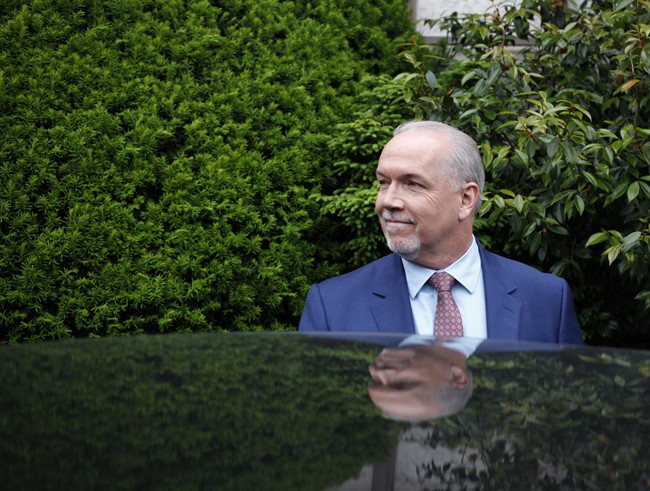With just a few hours until John Horgan becomes B.C.’s 36th premier, he joined CKNW’s Jon McComb to discuss his top priorities and what British Columbians can expect to see in the months ahead.

LISTEN: Jon McComb and Premier-designate John Horgan discuss the road ahead
There has been much discussion about the what the new premier will tackle first. From campaign finance reform, the housing affordability issue and a fentanyl crisis, it will be a busy few weeks ahead.
“My first order of business next week is to get to Ottawa to meet the prime minister and talk about the fires, talk about softwood lumber, talk about the fentanyl crisis and then we’re slated to drop down to Washington to make our case about being free and fair traders. We need to get a deal on softwood before we get caught up in the mire of NAFTA negotiations with the U.S. government.”
Horgan went on to explain his relationship with Ottawa and how they must collaborate on a number of issues.
“Starting with transit and transportation initiatives in the Lower Mainland. The federal government’s getting back into the housing game which is really important for us to try and tackle housing affordability and child care, which is something that we campaigned on.”
Political Donations
Despite a fundraising email from the NDP that went out just this morning, Horgan said reforming B.C.’s system of political donations remains a top priority. He said the party raises more than 80 per cent of its funds from individual donors, and that it will ban corporate and union donations by early September.
“We will change the election finance laws in British Columbia at the first week of the first sitting of an NDP government, which I expect to be in the next number of weeks. That was the agreement we reached with the Green caucus and that’s what we intend to do.”
WATCH: John Horgan announces Lt.-Gov has asked him to form government

B.C. Economy

Get daily National news
When asked about how the province stands financially, Horgan said that the new government will need to dig deeper into the material that they have been receiving.
“[Finance minister] Mike De Jong did a pre-emptive release of the public accounts in an attempt to make the case that the government should stay. The books have not been audited, the auditor-general has not completed her work, so we’ll have to see what comes from that.”
He went on to say that his biggest concerns are at BC Hydro and ICBC.
“They are cost drivers for people. Your listeners paid increased Hydro rates over the past number of years. Car insurance has been going up and is projected to go up even further.”
Fentanyl Crisis
Horgan said that there is not enough being done to curb the fentanyl crisis.
“We’re not making progress. People are dying at far too great of a rate and we need to stem that and there’s a whole range of issues that we want to bring forward.”
He said his government will prioritize the crisis by swearing-in a minister responsible for mental health and addictions Tuesday afternoon.
WATCH: NDP-Green alliance unveils its deal

Confidence and Supply Agreement Secretariat
Horgan touched on the formal complaint from the BC Liberals to B.C.’s comptroller general Carl Fisher over the NDP’s planned “Confidence and Supply Agreement Secretariat,” claiming it would be a partisan use of public money.
Horgan said the office would be doing government work, not partisan work — and he encouraged the BC Liberal Party to avail itself of the new resource.
“It’s open and transparent. I made a public announcement about it. We’re not being nefarious about this, we’re being transparent.”
“I believe there will be Liberals, as time goes by, who will welcome the opportunity to get access to information so they can better serve their constituents.”
He went on to criticize the Liberals’ decision to file the complaint.
“It’s a bit rich for the Liberals to say that the monies are being used inappropriately to better affect transparency in government.”
Freedom-of-information
Horgan said his government will also take a fresh look at access to information and government records keeping, areas he said have languished under the BC Liberals.
He said that lapse was most visible in government decisions around big projects like the Site C Dam.
“Who made the decision? Why did you make the decision? Why didn’t you use the B.C. utilities commission? When you’re going to spend eight, nine or ten billion dollars, show me the paper trail that led to that decision. I think after 16 years you start to get a lazy.”
Proportional Representation
The BC NDP and BC Greens have agreed to hold a vote on changing the way British Columbians elect politicians.
Horgan said work to develop the questions around whether B.C. should switch to a system of proportional representation will start right away and be put to the public when municipal elections take place in 2018.
“We want to make sure that we get as high a turn out as possible, but I believe that a minority government which we will be effective at 2 p.m. today, is an opportunity to demonstrate to people that you don’t have to have all the power to effectively use that power to improve the lives of your citizens.”







Comments